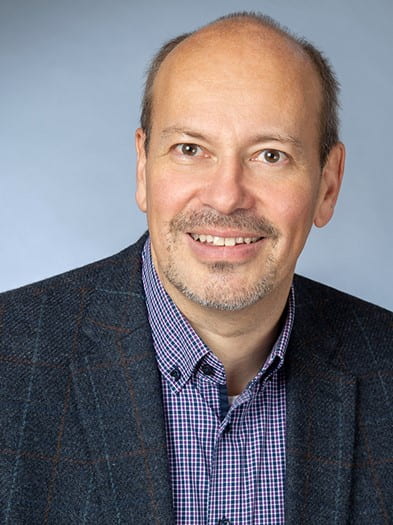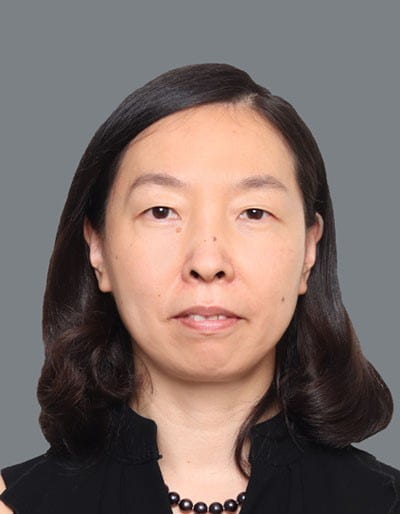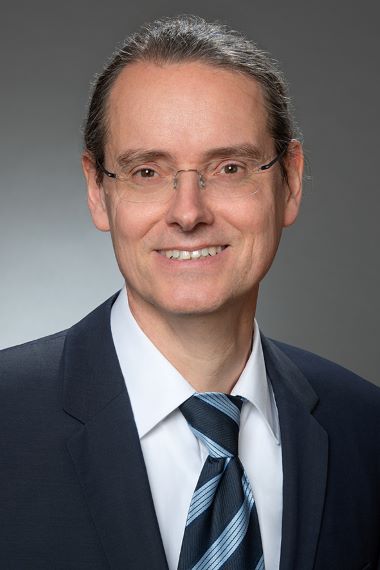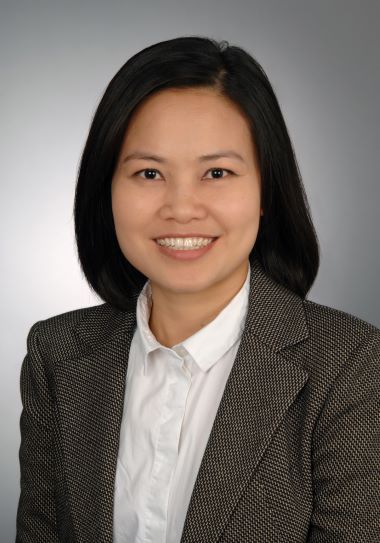1. Prof. Dr. Ralf Borndörfer, Freie Universität Berlin and Zuse Institute Berlin, Germany
https://www.zib.de/members/borndoerfer
 |
Short bio: Ralf Borndörfer is a Professor for Discrete Mathematics at Freie Universität Berlin and head of the Network Optimization department at Zuse Institute Berlin; he also serves as Scientist in Charge of the Application Area Networks of the Berlin Mathematics Excellence Cluster Math+, as president of the heureka Foundation for Environment and Mobility, and as one of the heads of the Traffic and Transport working group of the German Operations Research Society. His work is on combinatorial optimization and integer programming with applications to traffic and transport. He was head of several projects with Deutsche Bahn AG, in which RotOR, an ICE highspeed train rotation optimizer based on hypergraphical methods, was developed. This optimizer is integrated in DB’s FEO planning system, which was presented in the finals of the 2020 INFORMS Edelman award. |
2. Prof. Ying Chen, National University of Singapore, Singapore
https://blog.nus.edu.sg/matcheny/
 |
Short bio: Dr. Ying Chen is a financial statistician and data scientist. She develops statistical modelling and machine learning methods customized for nonstationary, high frequency and large dimensional complex data such as cryptocurrency, limit order book, and renewable energy. She also works on forecasting, quantum computing in finance, citation analysis and research metrics, financial text mining and sentiment analysis, and network analysis. Dr. Chen is Associate Professor in Department of Mathematics, Academic Director of the Digital FinTech PhD program in Asian Institute of Digital Finance, and Joint Appointee in Risk Management Institute (1 July 2019 to 30 June 2023), National University of Singapore. She also holds Joint Appointment in Department of Statistics and Applied Probability (1 January 2019 to 31 December 2021), and Courtesy Appointment in Department of Economics (April 1, 2018 to March 31, 2021) at the National University of Singapore. She is also Faculty member in NUS Graduate School for Integrative Sciences and Engineering since July 2016. Dr. Chen is Council Member of the International Statistical Institute for the period 2023 – 2027. She is Associate Editor of 4 journals including Statistica Sinica, Statistics and Its Interface, and Digital Finance. She is ISI Elected Member since March 2016. She is Scientific Secretary (August 2017 to July 2019) and member of Executive Committee of the International Association for Statistical Computing (IASC) from July 2017 and Board of Director ordinary member of the Asian Regional Section (ARS) of IASC. She is regular member of the Advisory Board of Institute of Statistical Mathematics, Japan from 1 April 2018 to 31 March 2022. |
3. Prof. Dr. Thorsten Koch, Technische Universität Berlin and Zuse Institute Berlin, Germany
https://www.zib.de/members/koch
 |
Short bio: Thorsten Koch is Professor for Software and Algorithms for Discrete Optimization at TU-Berlin and head of the Applied Algorithmic Intelligence Methods and the Digital Data and Information for Society, Science, and Culture departments at the Zuse Institute Berlin (ZIB). He has worked in several areas, especially the planning of infrastructure networks, chip verification, mathematical education, and integer optimization. From 2000 to 2020 he led the efforts on developing Integer Programming Solvers at ZIB, including the SCIP development. |
4. Dr. Thai Le, Zuse Institute Berlin/MODAL
https://www.zib.de/members/le
 |
Short bio: Thai Le is a researcher in Applied Algorithmic Intelligence Methods (A²IM) at the Zuse Institute Berlin. Her primary research focus centers around numerical methods and computations in Fluid Dynamics. An outstanding application of her research lies in supporting the right decision to optimize operations of renewable energy systems, including hydrogen and wind power at Research Campus MODAL. Dr. Le has made significant contributions to the field, featuring her work in reputable journals such as Physics of Fluids and the International Journal of Multiphase Flows. Additionally, she serves as a regular reviewer for these reputable journals. In addition, she was honored with awards from the Asian Pacific Consortium of Mathematics for Industry and a certificate of merit from the Minister of the Vietnam Ministry of Natural Resources and Environment, recognizing her exceptional research in tidal simulation in Da Nang Bay, Vietnam. In 2019, Dr. Le earned her Doctorate in Functional Mathematics at Kyushu University in Japan, financially supported by the MEXT Scholarship provided by the Japan Ministry of Education, Culture, Sports, Science, and Technology. Afterward, she actively engaged in research systems in Germany, collaborating with renowned institutions such as Technische Hochschule Nürnberg, Technische Universität Berlin, and Zuse Institute Berlin. |

